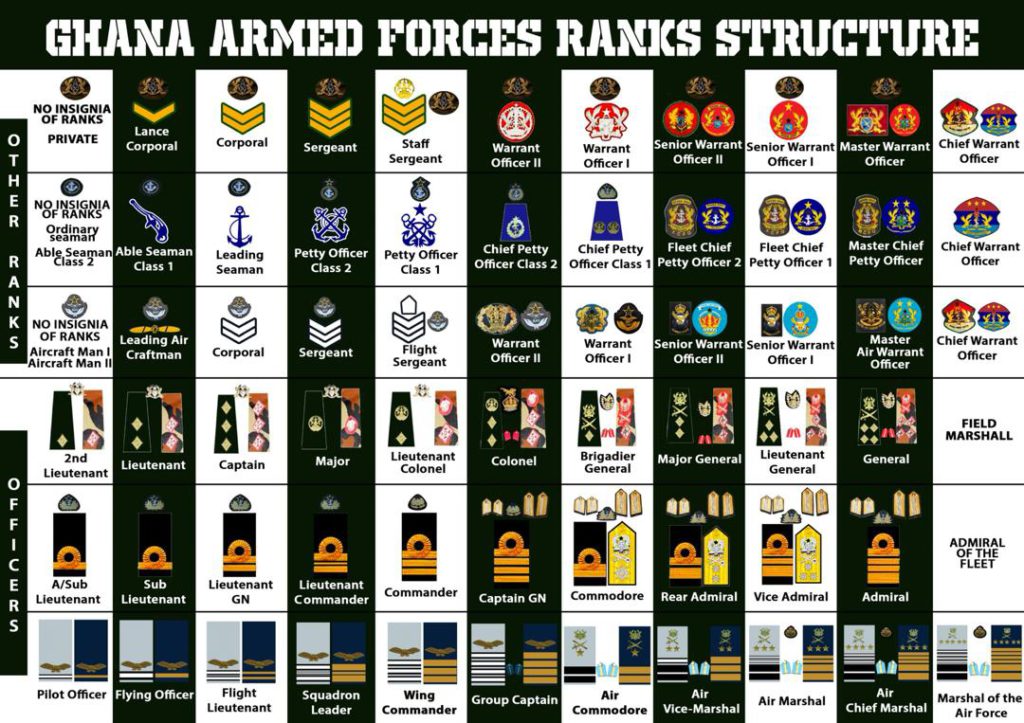
The Ghana Military Rank Structure
Nana continues to demand of me the education of the civilian populace on the Ghana military rank structure. The focus of this article is on the rank structure in the Ghana Armed Forces. This is basically modeled on British lines.
On commission after meeting all the requirements over a period of study, the trainee (Officer Cadet) becomes a Second-Lieutenant in the Army, or equivalent of Acting Sub-Lieutenant in the Navy, and Pilot Officer in the Air Force.
The officer ranks go from Second Lieutenant – Lieutenant- Captain as Junior Officers. Generally, subject to passing Promotion Examinations, it takes six years to become a Captain, and an additional five years to become a Major (eleven years in all).
Types of Commission
There are two kinds of courses/commission for officers. There is the Regular Career Course (RCC) for officers who train to become professional career officers.
There is a second category of Short Service Commissioned (SSC) officers. These are professionals like doctors, lawyers, teachers, architects, engineers etc. They train to become officers to pursue their original course of study as military doctors, educationists, lawyers etc. They are commissioned either as lieutenants or captains, depending on the antedate given for the duration of their courses in the university.
There is also a Special Duties (SD) Course which is run together with the Short Service Commission, hence SSC/SD Course. The SD Course is for Non-commissioned officers who are commissioned into specific areas of specialisation, e.g. Weapons, Quartermaster (Logistics) and Drill and Duties. They do not go beyond the rank of Major.
From Captain, the officer moves into the Senior officer zone from Major- Lieutenant Colonel – Colonel. Promotion examinations are taken along the line for advancement or otherwise. It took me twenty-six (26) years to become a Colonel.
From Colonel, an officer advances to the zone of Generals. The General rank from Colonel is Brigadier-General (One Star) – Major-General (Two-Star) – Lieutenant-General (Three-Star) and General-of-the-Army (Four-Star). There are Naval and Air Force equivalents which space will not allow me to discuss for now.
Other Ranks (Non-Commissioned Officers) in Ghana Military
With the Other Ranks, on passing out from the Training Centre the recruit starts as a Private. Progression from Private is to Lance-Corporal-Corporal-Sergeant- Staff Sergeant- Warrant Officer Class 2-Warrant Officer Class One. In recent times, some Americanisms have been added to the British ranks in Ghana. Hence there are Master Warrant Officers, Chief Warrant Officers and Service Warrant Officers etc we the older generation are trying to understand.
Appointments
The Ghana Armed Forces is made up of three Services; the Army, Navy and the Air Force.
Each of them is headed by a Service Chief. The Army has the Chief of Army Staff (COAS), the Navy the Chief of Naval Staff (CNS) and the Air Force the Chief of Air Staff (CAS).
They are all two-star Generals and equivalent. The Chief of the Defence Staff CDS) is the head of the Armed Forces of Ghana and is a three-Star General.
Discussion
Before independence in 1957, we had the Gold Coast Regiments. At independence, they became the Ghana Army. On 29th July 1959, an Act of Parliament laid by Osagyefo Dr Kwame Nkrumah established the Ghana Navy. The Ghana Air Force started on 24th July 1959 as a Flying Training School to complement the Army and Navy.
Though highly acknowledged as one of the leading UN Peacekeeping Nations in the world, domestically, the Ghana Armed Forces has a soiled image starting in 1966, when then Col Kotoka (later Lt Gen) and his Brigade Major, (later Lt Gen A.A. Afrifa,) together with Police Commissioners Harley and Deku, in collusion with foreign powers, overthrew Ghana’s First Republic.
In 1972, Col (later Gen) I.K. Acheampong overthrew Dr K.A. Busia’s Second Republic in a bloodless coup.
In 1979, a mutiny by junior ranks resulted in the overthrow of Lt Gen Akuffo's SMC 2 and the installation of Flt Lt Rawlings as the Chairman of the Armed Forces Revolutionary Council, which later made way for the installation of President Limann’s Third Republic.
The June 4th 1979 together with 31st December 1981 coup marked the bloodiest period in Ghana’s history.
Indeed, at the time of writing 30th June 2023, the 41st Anniversary Church Service was held at the Holy Spirit Cathedral, Accra to commemorate the 41st anniversary of the abduction, murder and attempted incineration of three High Court judges and a retired Army Major.
In the field of international Peacekeeping, Ghana has done remarkably well. Lt Gen E.A. Erskine was the first African to command a UN Force. In 1978, he established the United Nations Interim Force in Lebanon (UNIFIL).
Later the Force was commanded by another Ghanaian Lt Gen Seth Obeng. There have been many Deputy Force Commanders as well as top Staff appointments.
The Ghana Armed Forces continues to play a major role in Internal Security in support of the Police.
Leadership, lead! Fellow Ghanaians, WAKE UP!
The writer is a former CEO, African Peace Support Trainers Association, Nairobi, Kenya and Council Chairman, Family Health University College, Accra
